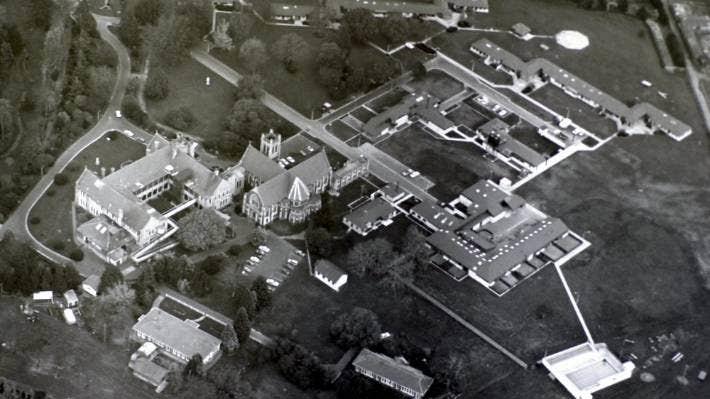
A man who survived and witnessed sexual and physical abuse at Catholic-run schools says the way the church investigates complaints of wrongdoing needs to change.
Brendon Bowkett reported the abuse to the church's complaints body, but it said it only looked at sexual abuse, adding that physical abuse complaints were dealt with by the religious order involved.
Bowkett was abused when he was a schoolboy in Dunedin.
"My experience was short and sharp, so to speak, in terms of the sexual assault I experienced in the playground of St Edmund's in the 1970s by the headmaster of that school," he said.
What he witnessed there and at St Paul's High School had not left him, he said, and five years ago he complained to the Catholic Church's National Office for Professional Standards.
"The worst part of what I experienced was the violence, the grooming - watching many friends experience really unrelenting psychological and physical violence of a scale that would put these perpetrators in prison if they were still alive."
Given what happened at the schools, run by the Christian Brothers, plus what had emerged from the likes of the Order of St John of God in Christchurch, Bowkett said there should be no mincing words.
"In my opinion, we've crossed the threshold and a crime against humanity against these children has occurred."
Now living in Newcastle, in Australia, Bowkett is a paediatric surgeon.
He said he was speaking out as a survivor of abuse, but also to remember those who had not survived, including those who died by suicide.
"The worst of my abuse was in Standard 4 by a teacher known as Mr Diack at St Edmund's. There's been no investigation into his behaviour.
"I would see him throw kids around the classroom, lift kids by the scruff of the neck, slam them into walls."
It was physical abuse such as this that the National Office for Professional Standards did not look into.
It only examined allegations of sexual abuse - finding, in Bowkett's case, that it probably did occur.
Allegations of physical abuse were passed to the church organisation at the centre of claims to investigate.
For Bowkett's complaint, that was the Christian Brothers. He said this was not acceptable because survivors might not want to have anything to do with the organisations they were complaining about.
"The biggest issue is the thought that other children that I saw go down, or be abused far worse than I experienced, haven't had justice."
In a statement, the National Office for Professional Standards did not say why it did not investigate allegations of physical abuse, but it said it took seriously all complaints.
If complaints fell outside the office's scope, they were referred to the appropriate diocese or religious congregation to respond.
"Investigations are carried out by independent and experienced people, whose reports are reviewed by a committee of people who are not priests or members of religious congregations."
A statement from the Christian Brothers Oceania Province said it had demonstrated a commitment to work with any person coming forward in an informed and responsible way.
"All claims are dealt with on their merits, and we encourage all people to be independently legally represented."
Network for Survivors of Abuse in Faith-Based Institutions spokesman Murray Heasley said it was a denial of natural justice for the church to be a judge in its own court.
"Another fundamental problem with the [National Office for Professional Standards] is the complaints assessment committee is a church committee.
"We don't know who's on it. It's like a star chamber," he said.
"These complaints that are laid - it's extremely difficult to be able to substantiate why it's been accepted as substantiated or not."
In 2021, a Royal Commission into abuse in care interim report found redress systems such as the church's lacked independent oversight.
Heasley wanted to see an independent body for all state- and faith-based investigations and restitution.
Bowkett agreed.
"The office needs to be moved entirely outside of the church. They can have representatives on it, but the governance of it needs to be outside of the church.
"It needs to report to external governance."
He said he just wanted his complaints of vile abuse properly investigated.
Where to get help
- Need to Talk? Free call or text 1737 any time to speak to a trained counsellor, for any reason.
- Lifeline: 0800 543 354 or text HELP to 4357
- Suicide Crisis Helpline: 0508 828 865 / 0508 TAUTOKO (24/7). This is a service for people who may be thinking about suicide, or those who are concerned about family or friends.
- Depression Helpline: 0800 111 757 (24/7) or text 4202
- Samaritans: 0800 726 666 (24/7)
- Youthline: 0800 376 633 (24/7) or free text 234 (8am-12am), or email talk@youthline.co.nz
- What's Up: free counselling for 5 to 19 years old, online chat 11am-10.30pm 7days/week or free phone 0800 WHATSUP / 0800 9428 787 11am-11pm
- Asian Family Services: 0800 862 342 Monday to Friday 9am to 8pm or text 832 Monday to Friday 9am - 5pm. Languages spoken: Mandarin, Cantonese, Korean, Vietnamese, Thai, Japanese, Hindi, Gujarati, Marathi and English.
- Rural Support Trust Helpline: 0800 787 254
- Healthline: 0800 611 116
- Rainbow Youth: (09) 376 4155
- OUTLine: 0800 688 5463 (6pm-9pm)
If it is an emergency and you feel like you or someone else is at risk, call 111.












